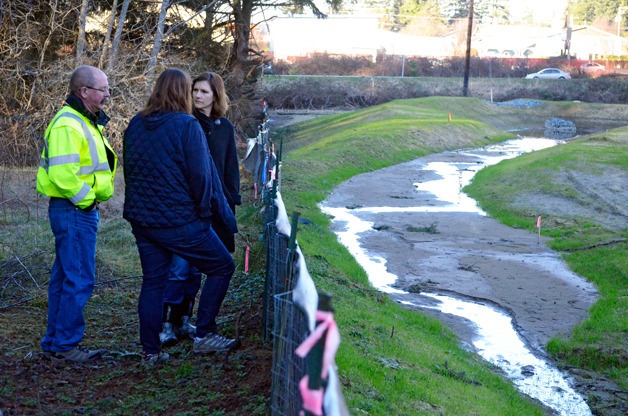Until a drainage problem is resolved, Sunny View Village in Freeland won’t be issued an occupancy permit.
Dave Wechner, director of Island County Planning and Community Development, confirmed this week that flooding onto a neighbor’s property will need to be corrected before residents of the still-under-construction development can move in. The drainage system must be built according to plan, which was approved by Island County Public Works, and functioning as designed before a permit will be issued, wrote Wechner, in a Friday email to The Record.
“… when it is built and functioning as it should, then we approve occupancy,” Wechner said.
Sunny View is a $6.3 million project of the Island County Housing Authority, a state special-purpose district not affiliated with county government. The organization works to provide safe, sanitary and affordable housing to low-income and elderly residents, according to its website.
Teri Anania, the housing authority’s executive director, was out of the office this week and attempts to reach her by telephone and email for this story were unsuccessful.
Late last year, after construction was well underway, the Wichers complained that the northeast corner of their lot was being flooded with runoff released from the development’s water retention system. They claimed it was a new problem and a direct result of the project.
The housing authority’s engineering firm, Freeland-based Davido Consulting Group, argued at the time that topographical maps suggested the area is a natural low point and water collection point.
Since then, all three Island County commissioners have visited the property, the last of which occurred last week. Commissioner Jill Johnson, who represents Oak Harbor, toured the area with Minda Wicher and Island County Public Works Director Bill Oakes.
During the visit, Wicher expressed frustration that the issue has not yet been resolved and it’s still not entirely clear who will make the fix.
“I feel we’ve gone round and round about who is responsible,” she said.
Oakes said the Wichers can look to him.
“If you’re looking for someone to blame, blame me,” he said.
The drainage system was designed to empty into a ditch along the highway that led west to Fish Road. The problem is the ditch doesn’t actually exist and it’s not clear that it ever has.
According to Oakes, the public works official who reviewed Davido’s designs never visually confirmed the ditch’s presence. He added that doing so would have been difficult, as much of that part of the Sunny View property was covered in blackberry bushes, and that the county isn’t required to make visual inspections; it has the right to rely on engineering reports from a developer.
“We’re a small county — we can’t check everything,” said Oakes, in a later interview with The Record.
Furthermore, Oakes said it’s ultimately the housing authority’s responsibility to address the problem. The agency is working on a solution that would pump water back uphill, then drain into the ground through a rock-filled ditch. But Oakes said it may be asking too much.
“That’s more than we’d require,” Oakes said. 
The easiest, and perhaps most affordable option, is to install the missing ditch, he said. Doing so would require an easement from the Wichers and at least two other property owners if it were to stretch all the way to the intersection at Fish Road, which is a major drainage point for storm water and natural runoff into Holmes Harbor.
Whatever the case, it’s largely between the housing authority and the property owners to resolve, he said.
“I can’t order them [the housing authority] to go onto another person’s property and dig a ditch,” Oakes said.
Wicher said this week that she and her husband would consider an easement, but that, “It’s not going to be free, it’s going to cost money.” Concerns about stormwater and wetlands were voiced before construction began, but a problem still arose. She said they feel they’ve been largely ignored and are now paying the price.
The Wichers worry that the county’s guarantees for a fix are empty promises, that an occupancy permit may still be granted without a real and lasting solution. She said that’s something they simply can’t afford, and that if needed they’ll seek legal remedies.
“We have to; we’re not wealthy people,” Wicher said. “This is it, our big investment — our home. Our value has been reduced.”


